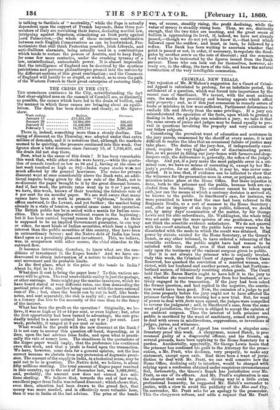THE CRISIS IN THE CITY.
THE uneasiness continues in the City, notwithstanding the fact that clear-sighted men on the summit of Cornhill see, as distinctly as possible, the causes which have led to the drain of bullion, and the manner iu which those causes are bringing about an equili- brium. The drain has been decisive and steady, as the figures show.
Week ending.
Decrease.
January 13 £16,224,129
January 20 16,884,498 339,831 January 27 15,569,096 326,402 February 1 14,277,710 1,281,386
There is, indeed, something more than a steady decline. The rising of discount on the Thursday, was adopted under that extra million of demands, and it is notorious that, although the markets seemed to be quieting, the pressure continued into 'this week. Our figures show a total decrease since January 13, of 1,946,419, and the drain did not stop there. Now, what is the cause‘of this drain ? It has been remarkable this week that, while other stocks were heavy,—while the quota- tion of consols touched as low as 94 and k, having at the close of
last week touched as high as NI—India rupee stocks wen not much affected by tfie general heaviness. The rates for private
discount went at once considerably above the Bank rate, an addi- tional impulse being given by the new rule of the Bank, not to re-discount the paper brought to it by the great discount houses. And if, last week, the private rates went up to 6 or 7 per cent, we have, this week, known of their touching the fabulous rate of 8 per cent for six months' paper. We are well aware that many causes have been at work to promote " tightness," besides an efflux eastward, to the Levant, and yet further ; the market being already in a state of tension, a special cause came into operation.
The British public has bean seized with a mania for Indian secu- rities. This is not altogether without reason in the beginning; but it has been carried beyond reason in the progress. As there is supposed to be an implied Government guarantee, in one way or other, for most kinds of Indian securities, which bear a higher interest than the public securities of this country, they have been in extraordinary favour ; and the Native debt of India has been fixed upon as a peculiarly pleasant investment. This, we believe, was, in comparison with other causes, the chief stimulus to the outward flow.
It becomes interesting, therefore, to know what are the con- ditions of investment in the Rupee bonds ? And we have en- deavoured to obtain information of a nature to indicate the pre- sent movement and its probable limits.
In the first place, what is the price of the bonds in India ? About ls. 90. to 1s. 10d. What does it cost to bring the paper here ? To this, various an- swers will be given. The real unavoidable outlay is just the postage, or other carriage. Some might pay the marine insurance, which we have heard stated at very different rates, one firm demanding the poetical price of 40s., another being content with the more rational sum of 10s. ; but, since the bonds can be cut in half, like bank- notes, and sent separately, the risk is really nil ; so that insurance is a luxury due less to the necessity of the case than to the fancy of the insurer.
What has been the profit on the operation ? Originally, we be- lieve, it was as high as 14 or 15 per cent, or even higher ; but, after the first opportunity had been turned to advantage, the rate gra- dually tended to a more natural level, say 6 or 7 per cent. Last week, probably, it ranged at 3 per cent or under. What would be the profit with the new discount at the Bank ? It is not easy to answer this question off-hand, depending, as it
does, upon the last advices from India, and upon what is practi- cally the rate of money here. The steadiness in the quotations of the Rupee paper would imply, that the preference has continued even this week, and that a profit is found upon the transaction.
We have, however, some data for a general opinion, not the less correct because we abstain from any pretension of dogmatic preci- sion. The amount of the supply in India, in a technical sense, may be said not to be in question. The Native debt, we believe, is about fifty millions sterling. The total amount of Rupee paper received in this country, up to the end of December last, was 4,098,0001., and, probably, the amount now does not exceed five mil- lions sterling. We believe that, towards the end of last week, excellent paper from India was refused discount; which shows that, even then, attention had been drawn to the grand fact, that money was more needed, and is effectively more valuable here, than it was in India at the last advioes. The price of the bonds
was, of course, steadily rising, the profit declining, while the 'slava money is steadily rising here. Thus, we see, distinctly enough, that the two tides are meeting, and the great ocean of bullion is approaching its level, if, indeed, we have not already passed,—though we do not yet quite know it,—that level which followed upon the outflow, and must, in turn, be followed by a reflux. The Bank has been waiting to ascertain whether that point is passed or not, in order, if necessary, to regulate the flood- gates by another screw on the rate of discount ; and the common herd waits to be instructed by the figures issued from the Bank parlour. Those who can look out for themselves, however, al- ready see, in the offing, the turn of the tide, and know the natural termination of the very intelligible commotion.






























 Previous page
Previous page